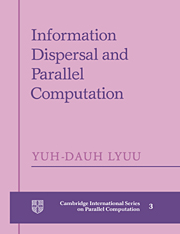Book contents
- Frontmatter
- Contents
- List of Figures
- Preface
- Acknowledgments
- Glossary of Notations
- 1 Introduction
- 2 Information Dispersal
- 3 Interconnection Networks
- 4 Introduction to Parallel Routing
- 5 Fault-Tolerant Routing Schemes and Analysis
- 6 Simulation of the PRAM
- 7 Asynchronism and Sensitivity
- 8 On-Line Maintenance
- 9 A Fault-Tolerant Parallel Computer
- Bibliography
- Index
1 - Introduction
Published online by Cambridge University Press: 03 October 2009
- Frontmatter
- Contents
- List of Figures
- Preface
- Acknowledgments
- Glossary of Notations
- 1 Introduction
- 2 Information Dispersal
- 3 Interconnection Networks
- 4 Introduction to Parallel Routing
- 5 Fault-Tolerant Routing Schemes and Analysis
- 6 Simulation of the PRAM
- 7 Asynchronism and Sensitivity
- 8 On-Line Maintenance
- 9 A Fault-Tolerant Parallel Computer
- Bibliography
- Index
Summary
It takes all the running you can do,
to keep in the same place.
If you want to get somewhere else,
you must run at least twice as fast as that!
—Lewis CarrollAfter briefly examining the challenges facing designing ever more powerful computers, we discuss the important issues in parallel processing and outline solutions. An overview of the book is also given.
The von Neumann Machine Paradigm
The past five decades have witnessed the birth of the first electronic computer [257] and the rapid growth of the computing industry to exceed $1,000 billion (annual revenue) in the U.S. alone [162]. The demand for high-performance machines is further powered by the advent of many crucial problems whose solutions require enormous computing power: environmental issues, search for cures for diseases, accurate and timely weather forecasting, to mention just a few [271]. Moreover, although unre-lenting decrease in the feature size continues to improve the computing capability per chip, turning that into a corresponding increase in computing performance is a major challenge [152, 316]. All these factors point toward the necessity of sustained innovation in the design of computers.
That the von Neumann machine paradigm [37], the conceptual framework for most computers, considered at the system level will impede further performance gains is not hard to see. Input and output excluded, the von Neumann machine conceptually consists of a processing unit, a memory storing both programs and data, and a wire that connects the two.
Information
- Type
- Chapter
- Information
- Information Dispersal and Parallel Computation , pp. 1 - 7Publisher: Cambridge University PressPrint publication year: 1993
